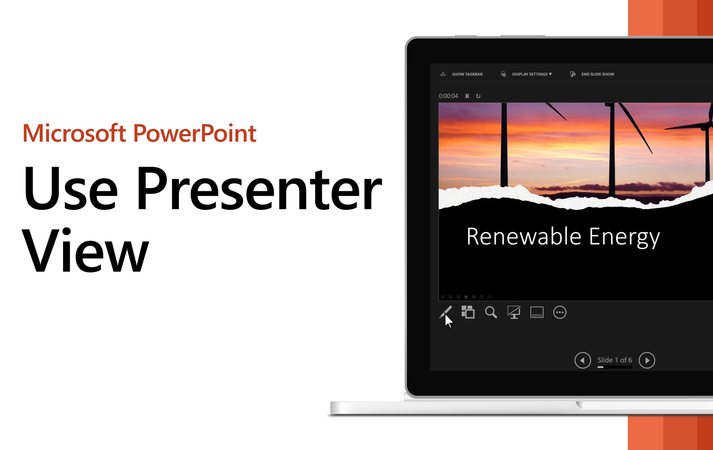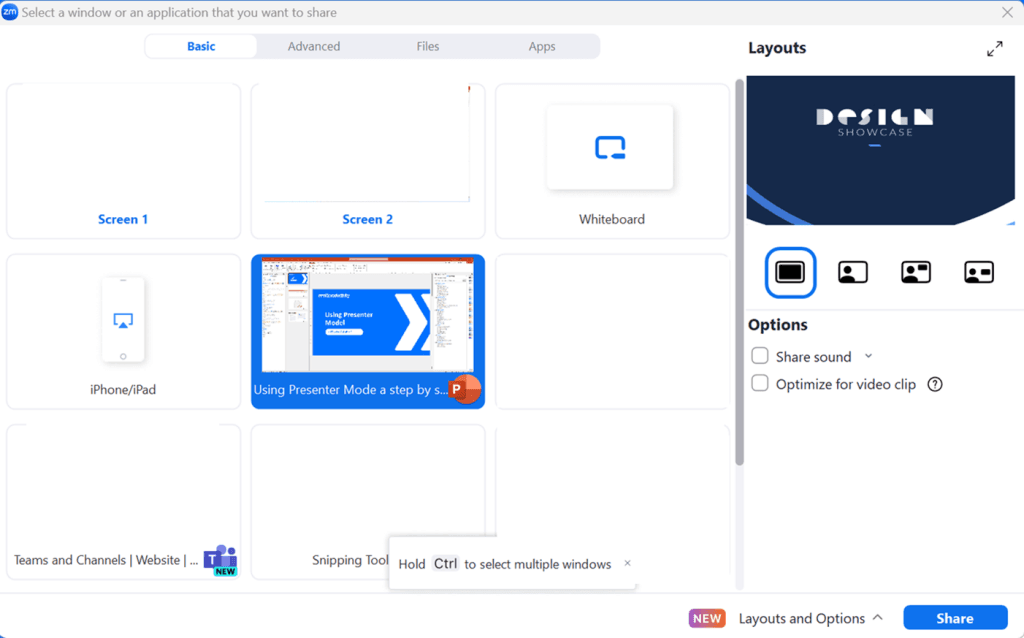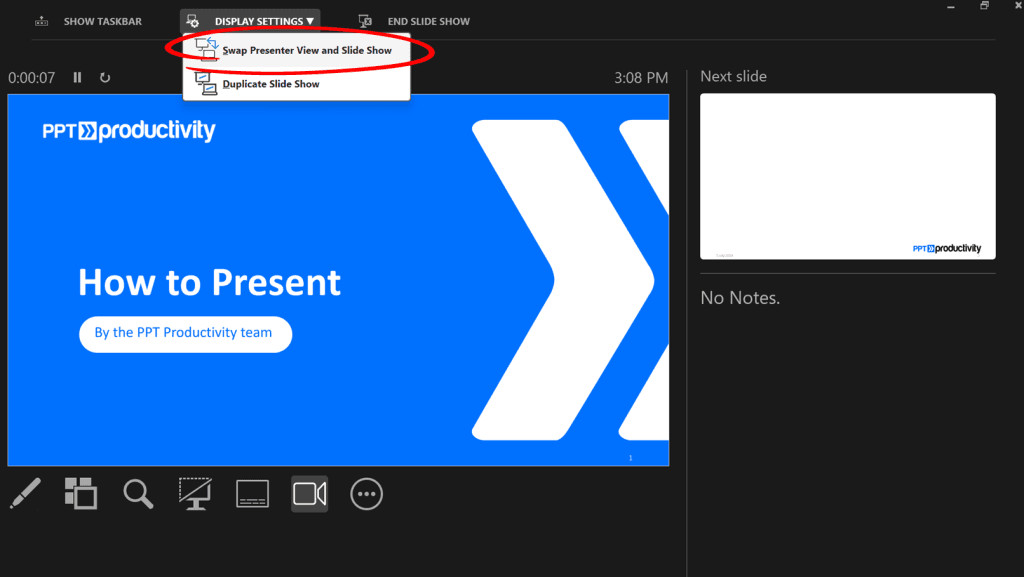
Microsoft PowerPoint’s Presenter View—also known as Presenter Mode—is a powerful feature that helps you stay on track and keep your audience engaged. In this guide, we’ll show you how to use Presenter View with both single and dual monitor setups, and share helpful tips for presenting on Zoom, Microsoft Teams, and Google Meet. We’ll also include common troubleshooting advice to ensure your presentation runs smoothly from start to finish.
Setting Up Presenter View in PowerPoint
Step 1: Preparing Your Presentation:
- Open your PowerPoint presentation.
- Click on the “Slide Show” tab on the Ribbon.
- Check the “Use Presenter View” box (refer to the image below for guidance).

Step 2: Configuring Display Settings
Additional steps if you are using dual monitors:
- Connect your second monitor.
- In PowerPoint, go to the “Slide Show” tab and click “Set Up Slide Show.”
- Under “Multiple monitors,” select your primary display as “Automatic” or select the monitor you want to use for Presenter View.
- Click “OK.”

Presenting on Zoom with PowerPoint Presenter View
Presenting in Zoom via Dual Monitor Setup
- Start your Zoom meeting and share your screen.
- Select the window with your PowerPoint presentation (the one that shows your Presentation).
- When you have a share screen active in Zoom, a thin green bar will display around the window being presented – it’s worth checking to make sure you can see the thin green bar around the screen you are presenting, rather than your Presenter view)
- Start your presentation. Your audience will see your slides, while you see the Presenter View.


Presenting in Zoom via Single Monitor Setup
How to view notes in PowerPoint while presenting with one monitor – in Zoom:
- Start your Zoom meeting and share your screen.
- Open your PowerPoint presentation and start the slide show.
- In Zoom, select “Share Screen” and choose your presentation window.
- When you have a share screen active in Zoom, a thin green bar will display around the window being presented.
- You can use Alt+Tab to switch between Zoom controls and Presenter View.
Presenting on Google Meet with Presenter Mode in PowerPoint
Presenting in Google Meet with Dual Monitor Setup
- Start your Google Meet call and click the “Present now” button (refer to the image below)
- Choose the “Window” option and select your PowerPoint presentation from the available windows (refer to the second image below for an example).
- Start your presentation. Your audience sees the slides, while you see the Presenter View.
Presenting in Google Meet with Single Monitor Setup
How to view notes in PowerPoint while presenting with one monitor – in Google Meet:
- Start your Google Meet call and click the “Present now” button (refer to the image below)
- Choose the “Window” option and select your PowerPoint presentation from the available windows (refer to the second image below for an example).
- Start your presentation in Presenter View.
- Use Alt+Tab to navigate between Google Meet and Presenter View.


Presenting on Microsoft Teams with PowerPoint Presenter View
Dual Monitor Setup
- Start your Microsoft Teams meeting.
- Click the “Share” button.
- Choose the window with your PowerPoint presentation (the one that shows Presenter View).
- Start your presentation. Your audience will see your slides, while you see the Presenter View.
Single Monitor Setup
- Start your Microsoft Teams meeting.
- Click the “Share” button.
- Select your entire screen or the window with your PowerPoint presentation.
- Start your presentation in Presenter View.
- Use Alt+Tab to switch between Microsoft Teams and Presenter View.
How to turn off Presenter View in PowerPoint
Once you have completed presenting, you can turn off presenter view
Tips for a Seamless Presentation with PowerPoint Presenter View
- Practice Beforehand: Familiarize yourself with Presenter View’s features, such as the timer, notes, and navigation controls.
- Use Notes Wisely: Presenter View allows you to see your notes without displaying them to the audience. Keep notes concise and relevant.
- Engage with Your Audience: Maintain eye contact with the camera, not the screen. Use the pointer or annotation tools to highlight key points.
- Check Your Setup before the event: Test your audio, video, and internet connection before the presentation. Have a backup plan in case of technical difficulties.
Troubleshooting Common Issues in PowerPoint Presenter View
Here are some troubleshooting suggestions for common issues when presenting using PowerPoint presenter mode:
- Presenter View Not Showing on the Correct Screen: If presenter view shows on the wrong monitor, you can easily correct this.
- Go to the “Display Settings” in Presenter View and swap displays (refer to the screenshot below for guidance on how to find this option), or simply stop your share and then restart the share so that you can select the correct screen
- Ensure your monitor configuration is correctly set in your operating system settings.

- Lag or Delay in Presentation: Presenting via videoconference can consume a lot of resources. If you are experiencing a lag or delay:
- Close unnecessary applications to free up system resources.
- Ensure a stable internet connection.
- Reduce video resolution in your meeting application if necessary.
- Audio Issues:
- Check your microphone and speaker settings in your meeting application.
- Ensure your audio devices are properly connected and selected.
- If Participants Can’t See the Presentation:
- Double-check the screen/window you are sharing.
- Verify permissions and settings in your meeting application.
- Presenter View Not Available:
- Ensure you are using a version of PowerPoint that supports Presenter View (available in Microsoft 365 and certain standalone versions).
